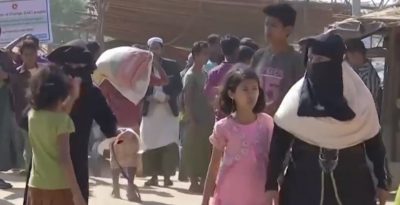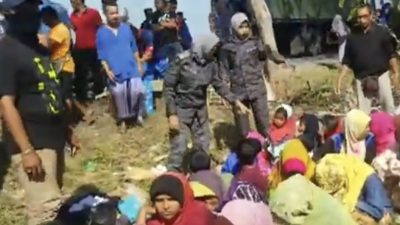Malaysia round-up of Bengalis over coronavirus: Malaysia to Myanmar and the UK legacy
Murad Makhmudov and Lee Jay Walker
Modern Tokyo Times

Sunni Muslim dominated Malaysia is arresting mainly Muslim migrants during Ramadan. This is ironic because this nation often lambasts Myanmar and espouses Muslim brotherhood. However, this over-simplistic reality never existed based on unique realities that exist in Malaysia.
For example, the persecution of Shia Muslims throughout the Sunni Muslim world happens from Afghanistan to Northern Nigeria. However, in Malaysia, the Shia faith is technically illegal. Similarly, other minority sects like the Ahmadiyya face persecution in Malaysia.
In recent times, growing voices among Malays have been raised towards Bengali Muslims. Hence, the ethnic and religious legacy of British colonialism continues in Bangladesh, Malaysia, and Myanmar where convulsions remain.
Bengali Muslims (Rohingya) were sent to Rakhine in Myanmar while Chinese and Indian migration to Malaysia took place under British rule. Likewise, the mainly Buddhist Chittagong Hill Tracts would eventually become swamped by Bengali Muslims under the rule of Bangladesh. Another legacy of the British.
Other convulsions persist based on the legacy of British colonialism. Thus, with tensions coming to a boil in Rakhine based on Bengali Muslim Islamization – just like in the Chittagong Hill Tracts – then tensions erupted in this part of Myanmar.
The knock-on effect is that the speakers of the Chittagonian language, spoken in Bangladesh, fled to many nations. At first, Malaysia played the “Muslim card” despite being anti-Shia Muslim. However, this is fraying because many Malays are fed-up with negative aspects of migration. For example, alleged criminality associated with some Bengali Muslims. In other words, the shared Sunni Muslim faith no more unites than it does among other faith communities throughout the world.
Thus, the international convulsions of coronavirus in Malaysia and other nations throughout Asia are highlighting the reality that migrants face. While in Malaysia, it is also increasing tensions that persist between some sections of the Malays and certain migrant groups.
Hence, migrants are suffering in special camps in Singapore after the outbreak of coronavirus. Likewise, migrants are being rounded up and isolated more in several Gulf nations. Similarly, Malaysia is also fearful of the spread of coronavirus among migrant communities.
The Guardian reports, “Those detained included young children and ethnic Rohingya refugees from Myanmar. Social media posts, including some by Malaysian politicians, have recently blamed Rohingya of committing crimes and accused them of dominating areas of the capital.”
Datuk Seri Hamzah Zainudin, the Home Minister of Malaysia, openly sites the Registrar of Societies Act (RoS) in his response towards unwanted immigrants. He said, “The Home Ministry has made checks with the RoS and found no organizations under the name ‘Rohingya’ are registered in Malaysia.”

He continued, “Any organization that claims to represent the Rohingya ethnic group is illegal under the RoS Act, and legal action can be taken… Therefore, Rohingya nationals who are holders of the United Nations High Commissioner for Refugees (UNHCR) card have no status, rights or basis to make any claims on the government.”
The United Nations uttered, “The fear of arrest and detention may push these vulnerable population groups further into hiding and prevent them from seeking treatment, with negative consequences for their own health and creating further risks to the spreading of Covid-19 to others.”
However, the Home Minister, understanding the fears of many Malays and equally worried about the coronavirus crisis, is adamant that Malaysia must focus on issues of national security. He said, “The government does not recognize their status as refugees but as illegal immigrants who are holders of the UNHCR card.”
The BBC reports, “Malaysia does not recognize refugees and there are high levels of distrust for those who come from abroad, often working as low-paid laborers.”
In truth, the Chittagong Hill Tracts, Myanmar, Malaysia – and the convulsions that tore India apart – are based on the twin forces of past Islamic invasions in “mother India,” to the legacy of the British Empire. For the British used the ethnic and religious card of divide and rule. Therefore, the United Kingdom and Bangladesh should step in and provide economic incentives to rebuild areas of Bangladesh for returning Bengalis caught up by the legacy of history.
If not, then convulsions of Bengali migration will continue to create tensions in Assam (India), the Chittagong Hill Tracts (Bangladesh), Malaysia, Rakhine (Myanmar), and other parts of India. At the same time, Bengali Muslims will face growing poverty and hostility. Also, Islamist terrorist forces will seek to utilize the situation to spread militancy unless a regional solution is found.
https://www.bbc.co.uk/news/world-asia-52515000

PLEASE DONATE TO HELP MODERN TOKYO TIMES
Modern Tokyo News is part of the Modern Tokyo Times group
DONATIONS to SUPPORT MODERN TOKYO TIMES – please pay PayPal and DONATE to sawakoart@gmail.com
http://moderntokyotimes.com Modern Tokyo Times – International News and Japan News
http://sawakoart.com – Sawako Utsumi personal website and Modern Tokyo Times artist
https://moderntokyonews.com Modern Tokyo News – Tokyo News and International News
PLEASE JOIN ON TWITTER
https://twitter.com/MTT_News Modern Tokyo Times
PLEASE JOIN ON FACEBOOK